- CANADIAN PALE
- A term used when the central stripe in a vertical triband has
internal proportions of 1-2-1 as in the Canadian national flag – but see note
below and ‘unequal triband’
(also ‘proportions 2)’,
‘pale’,
‘triband’ and
‘tricolour’).


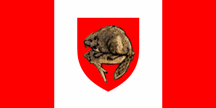
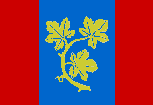
National Flag of Canada (CS); Flag of
North West Territories, Canada (fotw); Flag of
Brantford, Canada (fotw);
Flag of Benátky and Jizerou, Czech Republic (fotw)
Please note, it is suggested that the entry on pale and/or
a suitable glossary or heraldic dictionary be consulted before using this term, and that if used
at all it should apply only to Canadian Flags.
- CANTABRIAN LABARUM
- The flag of the Cantabrian independence movement showing a wheel-like emblem that is
considered symbolic of the ancient Cantabrians of Northern Spain.
![[Cantabrian Lebarum]](../images/v/vxt-d066.gif)
The Cantabrian Labarum (fotw)
- CANTABRARII
- Bearers of the ‘cantabrum.
- CANTABRUM
- An ancient Roman cavalry standard of uncertain configuration - but see note below.
Please note - not to be confused with a cantabrian labarum, although, this is believed (by some sources) to be a later interpretation of the ancient design -
(see 'cantabrian labarum').
- CANTING
- An originally heraldic term for when the design on a shield or any quartering thereof,
on a banner of arms or a flag
forms a pun on the name or attributes of the entity or person represented –
allusive arms or armes parlantes (see
also ‘armorial bearings’).
![[Queens Mothers flag - canting]](../images/v/vxt-d067.gif)
![[Greifensee, Switzerland - canting]](../images/v/vxt-d2372.gif)
![[Brodski Stupnick flag - canting]](../images/v/vxt-d1938b.gif)
![[Brodski Stupnick arms - canting]](../images/v/vxt-d1938a.gif)
![[Bila Tserkva - canting]](../images/v/vxt-d2371.gif)
Standard of her late Majesty Queen Elizabeth the Queen Mother, UK (fotw); flag of
Greifensee, Switzerland; Flag and Arms of
Brodski Stupnick, Croatia fotw);
flag of Bila Tserkva, Ukraine (fotw)
Notes
a) The Royal Standard of HM The Queen Mother shows the Royal Arms of Great Britain impaled with quartered Bows and Lions for her family name of Bowes-Lyon,
b) The German for griffon is Greif.
c) Stupisis is the Croatian for column.
d) Bila Tserkva means white church in Ukrainian.
- CANTON
- 1) Commonly, all or part of the upper hoist – or first - quarter of a flag’s
field that has not vertical divisions and/or otherwise undivided - the canton (see also
‘Appendix I’,
‘inner canton’ and
‘quarter 1)’).
- 2) A rectangular (or square) area of colour or design different from the field
in the above position, which may occupy exactly one quarter of the flag or a larger
or smaller area (see also ‘canton flag’ below,
‘covering’,
‘quarter 1)’ and
'Union’).
- One of the four quarters of a flag, divided horizontally and vertically into:
- (1) the upper hoist or upper hoist canton,
- (2) the upper fly or upper fly canton,
- (3) the lower hoist or lower hoist canton and
- (4) the lower fly or lower fly canton
- corresponding to quarters one to four of a shield divided quarterly
(see also ‘Appendix I’,
‘grand quarter’,
‘quarter 2)’,
‘quarterly’,
‘hoist’ and
‘fly’).
- 4) In heraldry as definition 2) except (although apparently of no fixed size)
heraldic use frequently suggests that a canton should occupy one-third of the
chief (see also ‘chief’).
![[absence example]](../images/v/vxt-d656.gif)
![[absence example]](../images/v/vxt-d656a.gif)
![[absence example]](../images/v/vxt-d656b.gif)
![[absence example]](../images/v/vxt-d656c.gif)
![[absence example]](../images/v/vxt-d656d.gif)
From left: National Flag of Liechtenstein (fotw); Flag of Kelantan, Malaysia (fotw); National Flag of Liberia (fotw)
- CANTONAL ARMS (or COAT OF ARMS)
- The arms of a territorial division within a country, particularly if that
subdivision is called a canton e.g., one of those cantons (regions) that
make up the Swiss Confederation, or those of Bosnia-Herzegovina or Costa Rica
- see state arms 3) under arms
(also cantonal flag).
![[Berne arms]](../images/v/vxt-d288.gif)
![[Posavina arms]](../images/v/vxt-d290.gif)
Arms of Bern, Switzerland (Wikipedia); Arms of
Posavina, Bosnia-Herzegovina (fotw)
- CANTONAL FLAG (or BANNER)
- The sub-national flag of a territorial division within a country,
particularly if that subdivision is is called a canton - e.g. one of the
cantons which make up the Swiss Confederation, or of Bosnia-Herzegovina or Costa Rica
(see also cantonal arms and ‘sub-national
flag’).
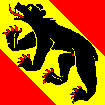
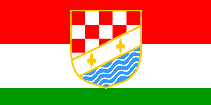
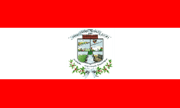
Flag of Bern, Switzerland (fotw);
Flag of
Posavina, Bosnia-Herzegovina (fotw);
Flag of Belen, Costa Rica (fotw)
- CANTONAL TRIANGLE
- The newly introduced term for a right-angled, triangular panel set with
its legs (or catheti) along the hoist and upper edge of a flag as illustrated
below – but see ‘triangular panel 1)’.
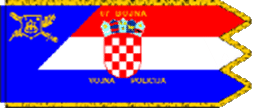
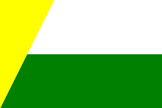
Unit Colour 67th Military
Police Battalion, Croatia (Željko Heimer); Flag of
Imues, Columbia (fotw)
- CANTONED CROSS
- See ‘cross cantonée’ in ‘appendix
VIII’.
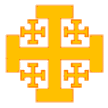
Flag of the
Kingdom of Jerusalem c1200 (CS)
- CANTON FLAG
- 1) A term used to describe the canton of a flag, or to describe the flag
itself, when its canton consists of another flag, as in for example the civil
ensigns of Australia and India, and the island flag of Nevis – a nationally
cantoned flag
(see also ‘armorial ensign 2)’,
British style ensign, ‘canton 2)’,
‘canton of St. George’,
‘civil ensign’ under ‘ensign’
and ‘colonial flag’).
- 2) See ‘cantonal flag’.
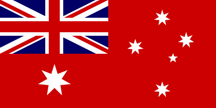
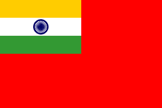


From left: Civil Ensign of Australia (fotw); Civil Ensign of
India (fotw); War Ensign of Brunei (fotw); Flag of the Island of
Nevis, St Kitts and Nevis (fotw)
- CANTON OF ST. GEORGE
- The term used when a flag’s canton is formed by the red cross of St George on
its white field – a St George’s canton (see also ‘canton 2)’,
‘canton flag’, ‘St George’s Cross 2)’
and ‘St. George's ensign’.

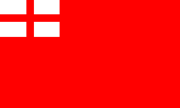

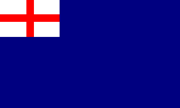
Some English Ensigns c1590 – 1707 (fotw)
- CAP BADGE
- See ‘badge 3)’.

Cap Badge of the
Grenadier Guards, UK (Wikipedia)
- CAP OF LIBERTY
- An ancient symbol in the form of a soft red cap which, as a consequence of having been
adopted by various revolutionary movements during the 18th century, has come to be regarded as a
symbol of resistance against monarchical or imperialist oppression – a liberty, Phrygian or
Scythian cap.

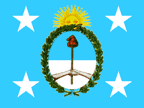
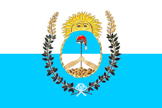

Current National Emblem,
Presidential Flag Afloat, and the Flag of the Army of the Andes 1817-18, Argentina (fotw);
Seal from the Reverse of the National Flag of Paraguay (Mello Luchtenberg)
- CAPTAINS COLOUR (or COLOR)
- See stand of colours 1) and venn.


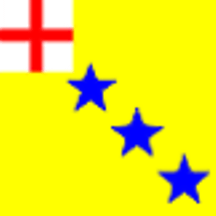



Examples of First the Third Captains Colours in Venn A and Venn B, English c1641 (fotw & CS)
- CAPTURED FLAG
- See ‘trophy flag’.

Flag Captured at Blakely, Alabama 1 April 1865 (civil-war.com)




![[Queens Mothers flag - canting]](../images/v/vxt-d067.gif)
![[Greifensee, Switzerland - canting]](../images/v/vxt-d2372.gif)
![[Brodski Stupnick flag - canting]](../images/v/vxt-d1938b.gif)
![[Brodski Stupnick arms - canting]](../images/v/vxt-d1938a.gif)
![[Bila Tserkva - canting]](../images/v/vxt-d2371.gif)
![[absence example]](../images/v/vxt-d656.gif)
![[absence example]](../images/v/vxt-d656a.gif)
![[absence example]](../images/v/vxt-d656b.gif)
![[absence example]](../images/v/vxt-d656c.gif)
![[absence example]](../images/v/vxt-d656d.gif)
![[Berne arms]](../images/v/vxt-d288.gif)
![[Posavina arms]](../images/v/vxt-d290.gif)























![[Cantabrian Lebarum]](../images/v/vxt-d066.gif)



